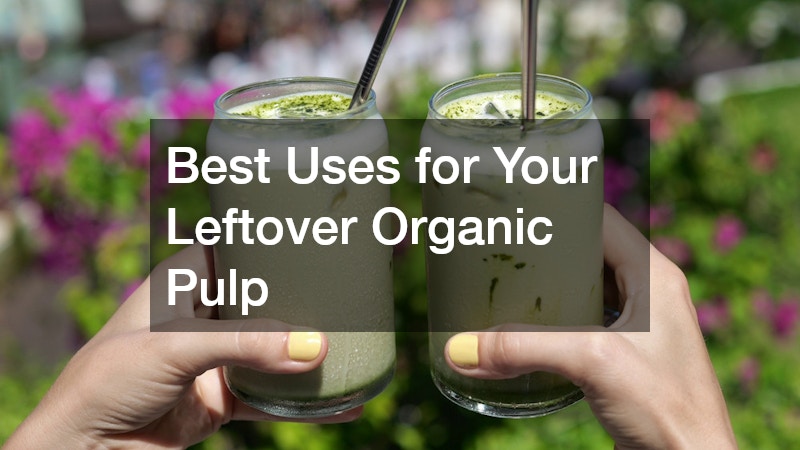Discovering how to make the most of your leftover organic pulp is both sustainable and rewarding. This article delves into creative and practical methods to utilize this nutritious byproduct effectively.
1. Can I Use Leftover Organic Pulp in Cooking?
1.1 Baking with Organic Pulp
Integrating leftover pulp into your baking not only enhances the flavor but also adds a nutritious punch to your baked goods. Quick breads and muffins can especially benefit from the subtle moisture and fiber that organic pulp provides.
You can replace a portion of the flour or wet ingredients with pulp, elevating simple recipes into nutrient-dense delights. Moreover, using organic fruit pulp can enhance the natural sweetness and make baked treats healthier. It’s an excellent strategy for reducing waste while ensuring your family consumes more fiber and vitamins. People searching for gluten-free or low-carb options can also experiment with pulp as a unique ingredient.
1.2 Adding Pulp to Soups and Stews
Enhance the texture and nutritional profile of soups and stews by incorporating organic pulp for a richer taste and thicker consistency. Root vegetable or tomato pulp is especially beneficial in hearty soups or vegetable broths. Add the pulp during cooking to allow flavors to meld, resulting in a more complex and satisfying dish. The additional dietary fiber in the pulp is an excellent way to support digestive health. It’s a simple method to add depth and nutrition without changing much of your original recipe. Embarking on this journey of utilizing pulp in cooking can be both exciting and enriching.
2. How Do I Incorporate Organic Pulp into My Garden?
2.1 Composting Organic Pulp
Learn how to effectively compost your leftover pulp to enrich your garden soil with organic matter, enhancing plant growth. The pulp breaks down quickly, providing nitrogen and carbon critical for compost development. Mixing pulp with other compost materials accelerates decomposition and helps in maintaining balanced moisture in the compost pile. A healthy compost not only reduces waste but also results in fertile soil that supports robust plant growth. Composting pulp is an accessible method for gardeners aiming to maximize soil health without synthetic additives. The utilization of compost can lead to healthier plants, creating a sustainable garden ecosystem.
2.2 Using Pulp as a Natural Mulch
Utilize pulp as a natural mulch to conserve moisture, suppress weeds, and gradually improve soil structure as it decomposes. Spread the pulp directly around plants or incorporate it into a mulch mixture. This method helps in reducing water evaporation and provides essential nutrients as the pulp breaks down. Over time, the pulp mulch contributes to enhancing soil structure and fertility naturally. Mulching with pulp is not only eco-friendly but also cost-effective for maintaining a healthy garden. Using organic pulp as mulch can lead to a noticeable improvement in plant conditions and garden sustainability.
3. Are There Skincare Benefits from Organic Pulp?
3.1 Creating DIY Facial Masks
Discover recipes for turning organic pulp into hydrating and rejuvenating face masks that cater to various skin types. Fruit and vegetable pulp can be combined with other natural ingredients like yogurt or honey. Pulp masks offer natural exfoliation and hydration, helping to clean pores and refresh skin. Making your masks is not only sustainable but also ensures you are using chemical-free products on your skin. Experimenting with different pulp types can reveal surprising benefits for your skin, from anti-aging to deep hydration. Organic pulp’s versatility in skincare can naturally enhance your daily beauty routine.
3.2 Pulp-Based Exfoliating Scrubs
Utilize the natural texture of pulp to craft exfoliating scrubs that cleanse and renew your skin. Combining pulp with coarse sugar or salt enhances its exfoliating properties.
These scrubs can be a natural alternative to synthetic exfoliants, offering gentler and eco-friendly skincare. Regular use can lead to smoother, youthful skin by removing dead skin cells and promoting cell regeneration.
Such DIY scrubs provide an opportunity to personalize skincare according to your specific needs, turning a waste product into a valuable beauty staple. Organic pulp ensures that your beauty regimen is both sustainable and skin-friendly.
4. Can Leftover Pulp Be Used for Pet Care?
4.1 Homemade Pet Treats
Create wholesome and delicious treats for your pets by incorporating leftover pulp into their snacks. Combining vegetable pulp with ingredients like oats or whole wheat flour can make tasty biscuits. DIY pet treats allow you to control the quality and source of ingredients, ensuring your furry friends get the best. Plus, it’s a fantastic way to use up leftover pulp while indulging your pets in healthy snacks. Offering your pets treats made from organic pulp can contribute to their overall better nutrition and digestion. Crafting homemade treats also strengthens the bond with your pets through shared, nutritious moments.
4.2 Pulp Enrichment for Animal Bedding
Enhance the comfort and enrichment of your pet’s bedding by mixing organic pulp with their usual bedding materials. Pulp can add softness and provide a more engaging environment for your pets. As the pulp gradually breaks down, it not only improves the texture of the bedding but also offers a natural source of entertainment and enrichment. This practical use of leftover pulp highlights an innovative approach to pet care. Merging pulp with regular bedding materials showcases an eco-conscious method to improve pet habitats. As a biodegradable product, organic pulp offers a natural cycle of use and decomposition supporting sustainability.
Leftover organic pulp offers a multitude of applications across different aspects of lifestyle, emphasizing sustainability and resourcefulness. By exploring these options, you can contribute to waste reduction and find joy in transforming waste into wealth.



